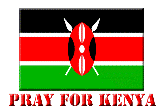This is one of the most powerful pieces, on how this crisis in Kenya has had an impact on what tribe you belong to.
The obituary of Simiyu Barasa written by himself.
He illustrates how some of our lives have changed as a result of this crisis.
I am aware of my tribe in a way that I was not before.
I am angry, and sad that the freedom that I felt in Kenya before December 30th has been taken away from me.
Living in the diaspora and encountering racism, having to always watch my back because of the colour of our skin, is stressful. Going home was always different, and therapeutic for me.
It has been a relief going to Kenya, and being able to walk around freely, in different parts of the country.
Now that is not the case. I am very clear that there will be certain parts of Kenya that I will not travel to, when I go home this year, as I do not want to be butchered.
Related article: The threat of talking in your mother tongue.
Update
The idea of Kenya belonging to all Kenyans and Kenyans having the right to live where they like is dead in the water. For some of the victims of the violence in the Rift Valley, this is the second or third time they have lost everything. Many have vowed never to come back. The message being telegraphed by the violence is that the only really safe place to put down any roots is among your own kind. Rift Valley for the Kalenjins, Central Province for the Kikuyus, and so on.
The Rift Valley is the largest of Kenya's eight provinces and, bar Nairobi, the most populous and ethnically diverse. People from all over the country have flocked to its urban areas and rural plantations. So in addition to the indigenous Kalenjin, there are large numbers of Kikuyu, Luhya, Luo, Kisii and others. Nothing wrong with that. Kenya, we were told over and over, was for all Kenyans. We were free to go where we wanted, live where we wanted.
For years this rhetoric concealed abiding anger surrounding land and its distribution: who had it, who didn't, why some had so little and others so much, how the land-rich had come to own what they did. But the lid was mostly kept on this disaffection until, in 1992, with the real possibility of losing power, Arap Moi cynically gave that anger a murderous outlet. Non-Kalenjin, we were told, were only visitors in the Rift Valley. They were welcome to stay as long as they toed the line, which meant voting for the right candidates.
Will any "outsiders" ever again stake their livelihoods on the existence of a country called Kenya and buy land in the Rift - or anywhere outside their districts of origin? Will we all retreat to the safety of our homogenous ethnic enclaves? Will we ever again be able to look each other in the eyes, to suppress the knowledge of the things we have done and are capable of doing to each other? And if not, what kind of country will we become?
The national memory is very long, and injuries are not easily forgotten or forgiven. The Rift is evidence of that. But now we are sowing a bitter wind of grievance, and unless we handle this cataclysm judiciously and with more courage and honesty than we have ever before mustered, we will certainly reap the whirlwind. National memory is long indeed. Let us never forget that our so-called leaders sold us all down the river.
Quotes from a bitter wind of grievance by Andia Kisia
Short Curly Haircuts for Women & More
-
Short Curly Haircuts for Women If you are interested in learning more about
short curly haircuts for women, click here. Locs Styles With Two Strand
Twist I...
1 day ago





2 comments:
My dream of being able to travel the borders of Kenya is now on hold for the next 5 years or so because we are now very fragmented and I know there are some parts of the country where my presence will not be appreciated one bit and could even cost me my life.
It is a shame that as a Kenyan living abroad I can now no longer see my own country as a place of refuge and freedom.
Acolyte,
We are in the same boat.
It is a shame and sad, very sad.
Post a Comment